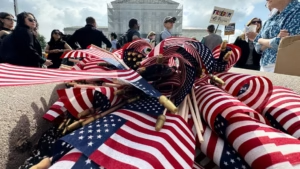 A federal judge agreed Thursday to issue a new nationwide block against President Donald Trump’s executive order seeking to end birthright citizenship.
A federal judge agreed Thursday to issue a new nationwide block against President Donald Trump’s executive order seeking to end birthright citizenship.The ruling from US District Judge Joseph Laplante is significant because the Supreme Court last month curbed the power of lower court judges to issue nationwide injunctions, while keeping intact the ability of plaintiffs to seek a widespread block of the order through class action lawsuits, which is what happened Thursday in New Hampshire.
Ruling from the bench, Laplante granted a request from immigration rights attorneys to certify a nationwide class that “will be comprised only of those deprived of citizenship” and issued a preliminary injunction indefinitely blocking Trump’s Day One order from being enforced against any baby born after February 20.
“The preliminary injunction is just not a close call to the court,” Laplante said during a hearing. “The deprivation of US citizenship and an abrupt change of policy that was longstanding … that’s irreparable harm.”
US citizenship, the judge added, “is the greatest privilege that exists in the world.”
The judge, an appointee of former President George W. Bush, said he would pause his order for several days to give the Trump administration time to appeal his decision.
Laplante’s ruling could prove to be a critical bulwark against Trump’s policy as other courts scramble to take a second look at their decisions in light of the Supreme Court’s ruling.
In February, Laplante indefinitely blocked the Trump administration from enforcing the order only against members of several nonprofit groups who would have been impacted by it.
“I’m the judge who wasn’t comfortable with issuing a nationwide injunction. Class action is different,” the judge said at one point during Thursday’s hearing. “The Supreme Court suggested class action is a better option.”
In his ruling earlier this year, Laplante said Trump’s order “contradicts the text of the Fourteenth Amendment and the century-old untouched precedent that interprets it.”
Several other judges similarly ruled that Trump’s order was unconstitutional, but their injunctions applied nationwide and prompted the administration to mount the series of appeals that eventually landed before the Supreme Court.
Laplante’s ruling could prove to be a critical bulwark against Trump’s policy as other courts scramble to take a second look at their decisions in light of the Supreme Court’s ruling.
In February, Laplante indefinitely blocked the Trump administration from enforcing the order only against members of several nonprofit groups who would have been impacted by it.
“I’m the judge who wasn’t comfortable with issuing a nationwide injunction. Class action is different,” the judge said at one point during Thursday’s hearing. “The Supreme Court suggested class action is a better option.”
In his ruling earlier this year, Laplante said Trump’s order “contradicts the text of the Fourteenth Amendment and the century-old untouched precedent that interprets it.”
Several other judges similarly ruled that Trump’s order was unconstitutional, but their injunctions applied nationwide and prompted the administration to mount the series of appeals that eventually landed before the Supreme Court.